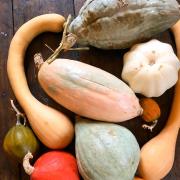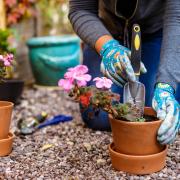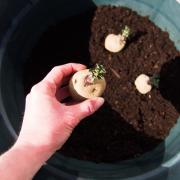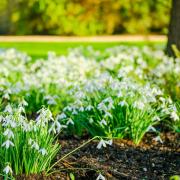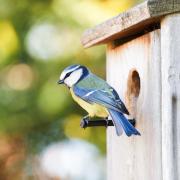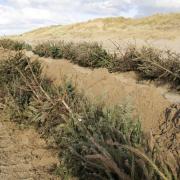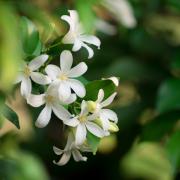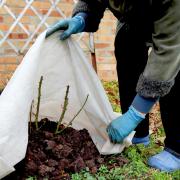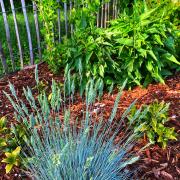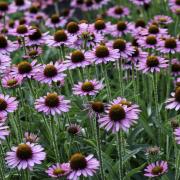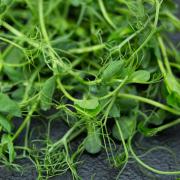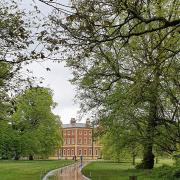Celebrate apple season by helping keep some of our county’s heritage varieties growing. Mairead Mahon reports

One of the consolations of summer departing is the promise of the glorious autumn fruit to come. One of the most popular is the great British apple. There is a quiet revolution among the apple growers of Lancashire: they’re on a mission to bring back our heritage apples.
There are over 2000 varieties of apples in our National Collection: varieties with wonderful names such as Ladies’ Finger of Lancaster; Royal George; Lord Suffield, Golden Spire and Pitmarston Pineapple – the latter so called because it of its fruity flavour. In the Victorian period, these apples were well known and often asked for by name.
‘In those days, every head gardener on an estate would hope to produce an apple variety and very often they were named after the aristocrat who owned the estate,’ said Philip Rainford, one of Lancashire’s most respected pomologists. ‘It was a real fashion and so many varieties were raised around this period.’
So why has it been that all of these glorious apples have disappeared? David Roberts, who is head gardener at Rufford Old Hall, where heritage apples are grown, explained: ‘There are many imported varieties of apples in the supermarkets and sadly, over the years, orchards have been flattened to make way for other crops.’

We used to have hundreds of orchards and although every area thought that they had the best, some believe Bretherton and Eccleston areas had the edge. Bolton and Wigan were only a pip behind and one of the Wigan varieties, Lange’s Perfection, was revered for its lovely deep, darkest maroon, skin. Sadly, many of these old orchards are lost but all hope is not gone. Thanks to the dedication of our region’s pomologists, several orchards, either new or re-discovered, are once again becoming a feature of Lancashire.
They are dotted throughout the county and many of them are community orchards, such as Grange-Over-Sands which was planted in 1998 and which has many rare varieties. There is also another in Eccleston, which was the brainchild of the inspiring expert, Joyce Morris, who began a programme of taking apples into local schools to pass on her knowledge.
Other examples of community orchards include those in Manchester, Bolton and Preston, as well as the one situated in the pretty village of Elswick.
Dr Rod Everett is a name recognised UK wide by those with an interest in this area. Rod, a well-respected ecologist, lives at Backsbottom Farm, Lancaster, where he is involved with many organic projects, including heritage apples. His enthusiasm for the fruit began about 10 years ago, when he became interested in the genetic make-up of apples in the North West. Unsurprisingly, how they react to our damp conditions is a part of that research and Rob now has an astonishing 200 varieties growing in his orchards. They are sometimes grafted and this has meant that these new trees have now gone on to re-establish these old varieties across the region. Luckily, we can all benefit, as some are for sale.

So, how we can help to make sure that some of our wonderful historical apples make their way back into our kitchens and fruit bowls? It’s simple – we make sure we buy them from the orchards are growing them. At Rufford, it is possible to buy directly from source but other orchards sell their fruit from farm shops.
It’s a little like tasting wines – taste often enough and your palette will soon become accustomed to the different taste sensation that each fruit offers. The Lord Suffield, which is grown at Rufford but which originated in Manchester in 1836, near to where His Lordship had an estate, lends itself well to cooking; as indeed does the Ladies’ Finger of Lancaster and the Harvest Festival, usually found around Lytham. This latter was raised by a local lady, Helen Lloyd, but it didn’t really come to prominence until she became Lady Mayoress. You will find, though, that your crumble or baked apple will taste slightly differently according to which variety you choose. Eating apples are fairly easy to distinguish. Those who have a sweet tooth might favour a variety like Florence Bennet, named after the Liverpool woman who raised it; while those who like a sharper taste might fancy a bite of Scotch Bridget, which was certainly popular in Victorian Lancaster.
There is a whole world of heritage apples being tended to in our region and whether you decide to help in a local orchard, maybe have a go at growing your own, or just enjoy eating them, there will be something you can do to actively welcome these fruits back to our Lancashire tables.
The best way of checking if there is an orchard near you is to contact The Northern Fruit Group. It might also be worth contacting them if you have an unidentified apple in your garden.




